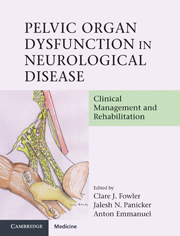Book contents
- Pelvic Organ Dysfunction in Neurological Disease
- Pelvic Organ Dysfunction in Neurological Disease
- Copyright page
- Contents
- Contributors
- Foreword
- Preface
- Section 1 Neurological control of pelvic organ functions
- Section 2 Evaluation and management
- Section 3 Specific conditions
- Appendix 1: Management algorithms
- Appendix 2: Surveys and questionnaires
- Index
Section 3 - Specific conditions
Published online by Cambridge University Press: 06 December 2010
- Pelvic Organ Dysfunction in Neurological Disease
- Pelvic Organ Dysfunction in Neurological Disease
- Copyright page
- Contents
- Contributors
- Foreword
- Preface
- Section 1 Neurological control of pelvic organ functions
- Section 2 Evaluation and management
- Section 3 Specific conditions
- Appendix 1: Management algorithms
- Appendix 2: Surveys and questionnaires
- Index
Summary
- Type
- Chapter
- Information
- Pelvic Organ Dysfunction in Neurological DiseaseClinical Management and Rehabilitation, pp. 167 - 306Publisher: Cambridge University PressPrint publication year: 2010



